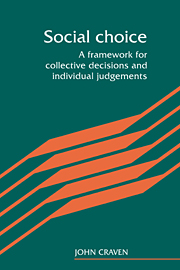4 - Collective rationality
Published online by Cambridge University Press: 15 September 2009
Summary
The original version of Arrow's theorem insists that social choices should look as though they were made by a fully rational individual. Such rational social choices are consistent with complete and transitive social preferences, using the Condorcet criterion to determine one from the other. We can only avoid the dictatorship of the previous chapter if we remove at least one of the conditions needed to demonstrate it. In this chapter, we consider the possibility of reducing the rationality conditions. Can we give intuitive meaning to, or examples of, social choice rules that satisfy only some of the conditions RC1 to RC4 for the collective rationality of social choices?
To some extent, we start at a disadvantage. The proof of theorem 3.7 does not use RC4, and so the dictator is inevitable even without full collective rationality. The proof of the epidemic and that there is a collective require RC1 and RC3; the inevitable dictator follows when we add RC2.
Limited path independence
One form of less-than-full collective rationality is limited path independence. This is illustrated by using a social choice rule in two ways:
(i) directly to find the choice set C(T) from set T of alternatives,
(ii) indirectly to eliminate alternatives by successive social choices from pairs of alternatives from T. Wherever only one alternative is chosen from a pair, the other alternative is eliminated from further consideration. Continue to make choices from pairs to eliminate as many alternatives as possible. The remaining, non-eliminated alternatives have been chosen by the indirect method. In principle, the outcome of the indirect method depends on the initial and subsequent pairings of alternatives.
- Type
- Chapter
- Information
- Social ChoiceA Framework for Collective Decisions and Individual Judgements, pp. 51 - 66Publisher: Cambridge University PressPrint publication year: 1992



